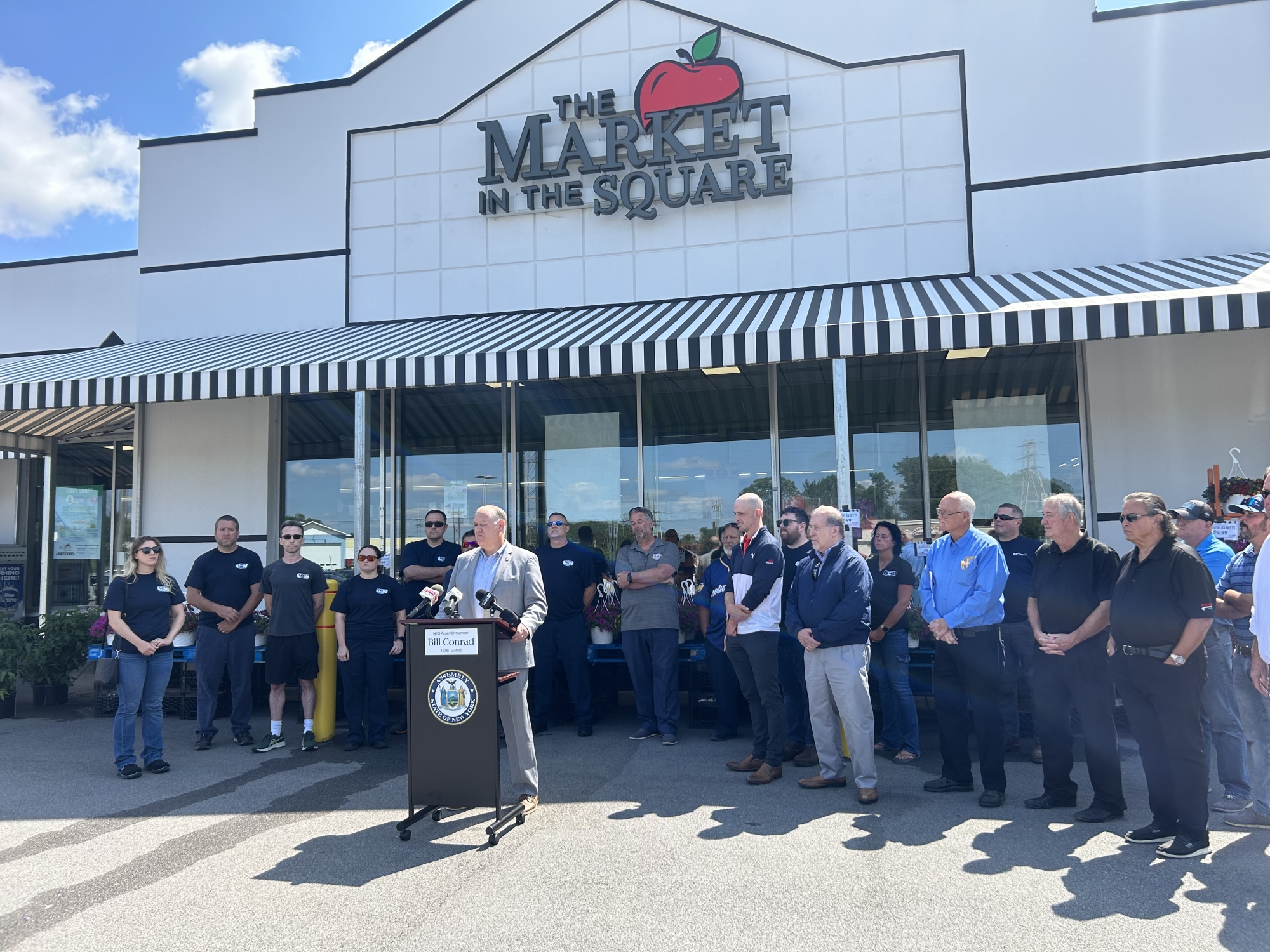NYS Assemblyman Conrad Leads Stakeholders in Final Push Against Refrigerants Ban
Experts warn a coming phaseout of hydrofluorocarbons would cost businesses and consumers millions, threaten jobs, and derail green energy programs
NORTH TONAWANDA – New York State Assemblyman Bill Conrad today, July 19, 2024, was joined at The Market in the Square by grocers, union laborers, refrigeration specialists, and other stakeholders in appealing to the state Department of Environmental Conservation (DEC) for changes to its proposed phaseout of hydrofluorocarbon refrigerants.
The DEC is expected to release soon the final iteration of its revisions to Part 494 of the regulations governing the statewide use of hydrofluorocarbons, or HFCs, which are heat-absorbing chemicals used in refrigeration and air conditioning equipment and as aerosol propellants and solvents.
As these revisions are currently written, climate-potent HFC use in certain sectors across New York State would be limited starting Jan. 1, 2025 – a timeline that Conrad and industry experts assert would cost thousands of jobs, force burdensome equipment changeovers and shutter businesses, and derail the state’s movement toward its climate goals.
The proposed ban is far more aggressive and near-term than anywhere else in the United States, including at the federal level, and even globally. The DEC announced the plan in December, citing it as a step toward implementation of the state’s Climate Leadership and Community Protection Act, a blueprint for climate progress that was signed into law exactly five years ago, on July 18, 2019.
However, as Conrad and his colleagues in the Legislature have learned from industry stakeholders, this hastily timed phaseout would force supermarkets, restaurants, and others in the food and beverage industry to replace or retrofit their refrigeration and HVAC equipment, costing each one between $300,000 and several million dollars. This would undoubtedly force out of business many grocers, particularly the small, independent operators, and exacerbate “food deserts” in disadvantaged neighborhoods.
Furthermore, refrigeration and HVAC specialists have indicated they would be required to switch to alternative chemicals and equipment that are neither readily available, nor proven to be any safer or higher performance. This would result in difficulties in servicing residential HVAC units –– and ultimately, mounting costs to consumers.
Finally, a ban on the HFCs used in spray-foam weather insulation would hamper efforts to conserve energy and upgrade efficiency in buildings across the state. For example, the use of HFCs in this capacity would violate compliance with New York City’s Greener Greater Buildings program, essentially eliminating $200 million in spray-foam business from across the state and impacting an estimated 2,000 jobs.
The appeal issued today by Conrad and the assembled group was for the DEC to release final HFC-phasedown regulations that align with, and do not exceed, those of the U.S. Environmental Protection Agency (EPA).
Conrad has also introduced a bill, A.10577, which would require regulations related to hydrofluorocarbon substances to conform with, and not to exceed, those set forth by the EPA.
In addition, Conrad authored two letters this year, one to Gov. Kathy Hochul and another to DEC Interim Commissioner Sean Mahar, which shared the same message and included sign-on support from his colleagues in the Legislature. Joining him in these efforts from the Western New York delegation were Assemblymembers Pat Burke, Karen McMahon and Monica Wallace.
Conrad in March submitted a comment during the DEC’s public comment period on this proposed change, and he appealed to the agency to extend that comment period for the benefit of stakeholders. DEC leadership refused his request.
Just this week, State Comptroller Thomas DiNapoli released the findings of a CLCPA audit. His office reports that the agencies tasked with drafting and implementing the CLCPA have under-planned, using outdated data to set New York’s climate goals, and have failed to accurately assess the costs and feasibility of meeting those goals in the established timeframes.
Assemblymember Bill Conrad said, “I’ve been hammering this point for months, in letters with colleagues to New York State’s executive leadership, in press interviews and written editorials, and in countless talks with my Assembly colleagues: This change would go unnecessarily far, threatening disaster for our union workforce, business community, average consumers – and even the state’s efforts, already underway, to combat climate change. That is simply counterintuitive.
“It was the stakeholders who elevated this concern to lawmakers in a constructive and thorough way. They in turn offered an environmentally conscious but more feasible way forward, and we should heed their expertise.
“In our collective quest for climate progress, we must not overburden businesses and everyday citizens with costly, ill-timed equipment and technology changeovers. If we are to successfully move away from fossil fuels, we first need broad market support to ensure this important transition is manageable, safe, and affordable.”
Assemblymember Pat Burke said, “Of course we have to protect the environment, but we cannot implement short-sighted policies that would shut down grocery stores across our region. This policy goes well beyond the scope of any other state’s and would cost millions of dollars to grocery stores.”
Assemblymember Karen McMahon said, “There can be no dispute that climate change is real and phasing out certain refrigerants will help us meet our goal of reducing harmful emissions. However, with regard to the proposed HFC regulations, I respectfully urge the DEC to pause its implementation and consider the financial and operational burdens that will be placed on the grocery, restaurant, and HVAC industries by the mandate to use refrigerants that are neither readily available, nor proven to be safe.”
Assemblymember Monica Wallace said, “The DEC’s proposed rules phasing out hydrofluorocarbons would put countless small businesses and employees out of work, substantially raise food costs during a time of high inflation, and shutter many grocery stores and restaurants, exacerbating food deserts in underserved neighborhoods throughout the state. While phasing out greenhouse gas emissions is an important goal, these rules simply go too far, too fast, and fail to account for the myriad unintended consequences of banning chemicals that are essential to refrigeration and air conditioning. I thank Assemblyman Conrad for his leadership on this issue, and I urge the DEC to heed our calls to revise the proposed rules on HFCs.”
The Market in the Square Owner Nick Kusmierski said, “The proposed regulations by the DEC will place an unnecessary burden on businesses in New York State. It will make countless small businesses less competitive in the marketplace and ultimately impact individual consumers and households. We understand the state’s desire to be more environmentally conscious. However, their proposals do not account for currently available options, the affordability of those options, or the expertise needed to install those options. We ask that the state align with the federal standards currently in place to allow for a transition that is feasible for all involved.”
Mesmer Refrigeration Owner Bob Mesmer said, “If put into place, the Part 494 amendments will severely affect farms, food manufacturers and distributors, supermarkets, convenience stores, and restaurants. The refrigeration and air conditioning industry will not be able to replace or add refrigerants to existing systems. The bottom line is, the proposed alternative systems are expensive to install, expensive to operate, and expensive to repair; this will force businesses to close and consumers to spend more. I thank Assemblyman Conrad for looking out for the people of New York State, and I strongly appeal to the DEC to change course and adopt the federal guidelines.”
United Steelworkers District 4 Director David Wasiura said, “This rule affects nearly every sector of New York State’s economy and presents significant challenges for our union steelworkers, who are heavily involved in producing and manufacturing refrigeration and HVAC systems used in various industries, including food processing, storage, and health care. The shift mandated by this rule would require these industries to significantly invest in new technologies, costing businesses millions of dollars. These increased costs to businesses could result in reduced production volumes and lead to reduced hours or even layoffs for our unionized employees.”

